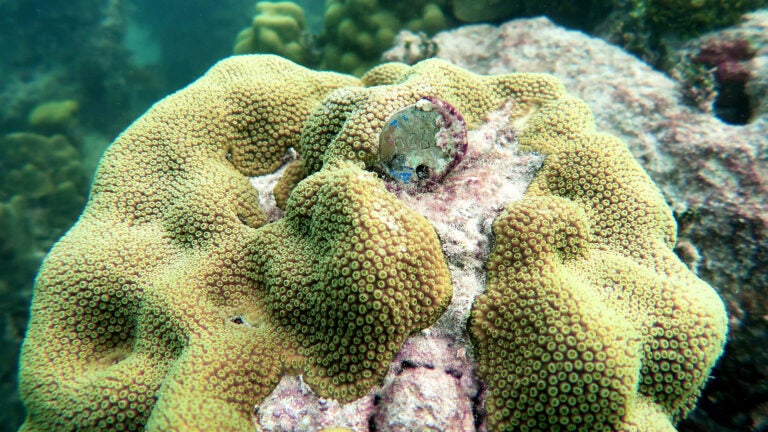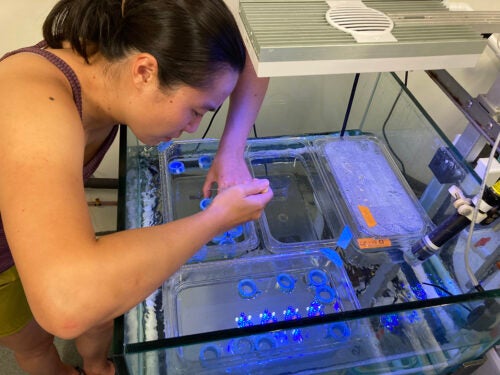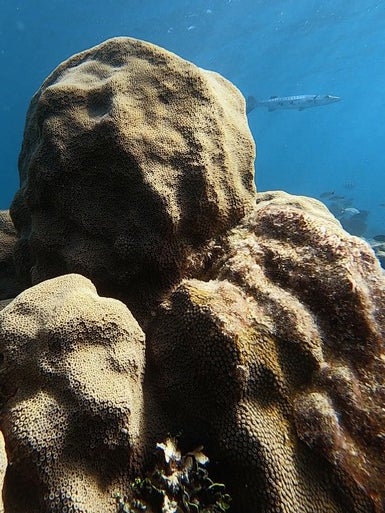
Surprising discovery about coral’s resilience could help reefs survive climate change
The factors affecting coral’s resilience — its ability to adapt to and survive environmental changes — seem to be more nuanced than scientists believed.
In a study published Oct. 17 in the journal Global Change Biology, researchers reveal surprising findings about a species common to Caribbean waters. The discovery may help improve efforts to save corals from bleaching and other consequences of climate change.
A team led by Assistant Professor of Biological Sciences Carly Kenkel at the USC Dornsife College of Letters, Arts and Sciences studied the mountainous star coral, Orbicella faveolata, to determine whether coral populations that have survived higher temperatures can pass their heat tolerance on to their offspring.
To the scientists’ surprise, the results showed the opposite: The offspring from a population that is less heat-tolerant performed better when exposed to high temperatures than their counterparts from a heat-tolerant population.

The findings counter the commonly held notion among scientists that if coral parents can handle the heat, so should their offspring.
Climate change threatens the survival of coral reefs globally. Rising ocean temperatures have led to coral bleaching, which weakens the coral, leaving them more susceptible to disease.
“The study findings have significant implications for how we think about saving coral reefs,” said Kenkel, who holds the Wilford and Daris Zinsmeyer Early Career Chair in Marine Studies at USC Dornsife. “It’s not as simple as just breeding more heat-tolerant corals.”
To assess which corals could more readily handle higher temperatures, the scientists collected coral reproductive cells, known as gametes, from two different coral reef sites in the Florida Keys. One site sits close to the shore and the other farther out to sea.
The researchers carefully bred the corals in a controlled environment and exposed the coral larvae to heat stress conditions in the lab. The researchers then measured how the corals survived. They also examined the activity of the coral genes to see whether they could detect signs of stress at higher temperatures.
The unexpected finding that coral larvae from the less heat-tolerant population survived better and showed fewer signs of stress suggests that the ability of coral offspring to handle heat might be influenced by various factors, including whether and how often their parents have bleached in the past or suffered other environmental pressures.

The researchers acknowledge that more research is needed to confirm their findings. The study focuses on one specific coral species, and different species may behave differently. Also, the research took place in a controlled lab setting, and many factors beyond temperature affect coral reefs in the wild.
The scientists hope to dig deeper into how corals adapt to environmental changes and pass on resilience, examining the impact of corals’ history and relationships with other organisms as well as the overall health of the reef.
Kenkel, who also conducts research as part of USC Dornsife’s Wrigley Institute for Environment and Sustainability, said coral rescue may require a more comprehensive approach.
“Instead of focusing solely on breeding more heat-tolerant corals,” she said, “we might need to consider other factors affecting coral survival and more diverse interventions.” This includes their genetic diversity and external stressors affecting their overall well-being.
By unlocking the secrets of corals’ ability to withstand rising temperatures, scientists might find new ways to help these essential ecosystems thrive in a changing world.
First author on the study Yingqi Zhang contributed to the research while a PhD student in Kenkel’s USC Dornsife lab. Now at the University of Utah, she sees the work as an important step toward saving reefs.
“We believe that this study opens up promising avenues for future research, which is critical to the success of reef management and restoration practices for this charismatic Caribbean coral species,” she said.
About the study
In addition to Kenkel and Zhang, authors on the study include Shelby Gantt, Elise Keister and Dustin Kemp of University of Alabama at Birmingham; Holland Elder, formerly at USC Dornsife and now at The Australian Institute of Marine Science; Graham Kolodziej, Catalina Aguilar, Michael Studivan of the University of Miami and the National Oceanic and Atomospheric Administration (NOAA) Atlantic Oceanographic and Meteorological Laboratory (AOML); Derek Manzello at NOAA’s Center for Weather and Climate Prediction; and Ian Enochs of the NOAA AOML.
The study was supported in part by NOAA funds.